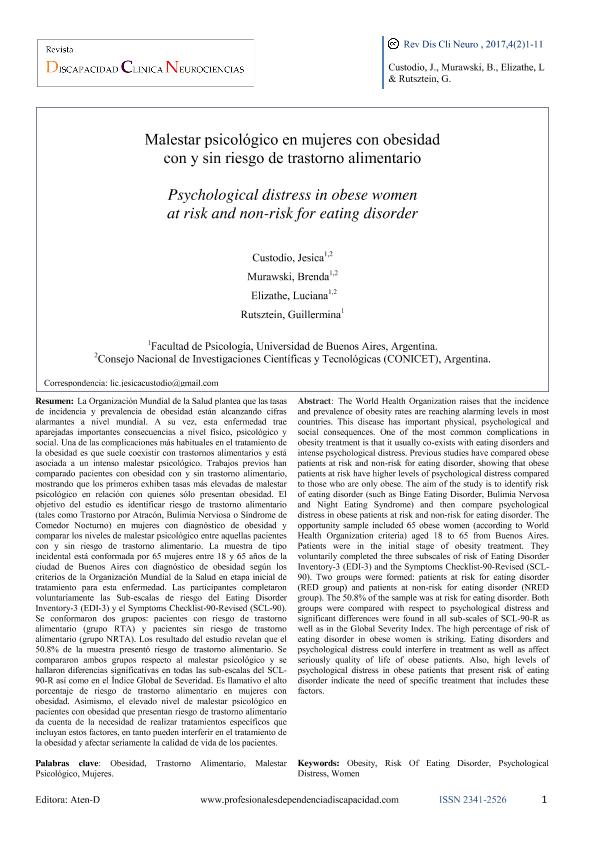Artículo
Resumen: La Organización Mundial de la Salud plantea que las tasas de incidencia y prevalencia de obesidad están alcanzando cifras alarmantes a nivel mundial. A su vez, esta enfermedad trae aparejadas importantes consecuencias a nivel físico, psicológico y social. Una de las complicaciones más habituales en el tratamiento de la obesidad es que suele coexistir con trastornos alimentarios y está asociada a un intenso malestar psicológico. Trabajos previos han comparado pacientes con obesidad con y sin trastorno alimentario, mostrando que los primeros exhiben tasas más elevadas de malestar psicológico en relación con quienes sólo presentan obesidad. El objetivo del estudio es identificar riesgo de trastorno alimentario (tales como Trastorno por Atracón, Bulimia Nerviosa o Síndrome de Comedor Nocturno) en mujeres con diagnóstico de obesidad y comparar los niveles de malestar psicológico entre aquellas pacientes con y sin riesgo de trastorno alimentario. La muestra de tipo incidental está conformada por 65 mujeres entre 18 y 65 años de la ciudad de Buenos Aires con diagnóstico de obesidad según los criterios de la Organización Mundial de la Salud en etapa inicial de tratamiento para esta enfermedad. Las participantes completaron voluntariamente las Sub-escalas de riesgo del Eating Disorder Inventory-3 (EDI-3) y el Symptoms Checklist-90-Revised (SCL-90). Se conformaron dos grupos: pacientes con riesgo de trastorno alimentario (grupo RTA) y pacientes sin riesgo de trastorno alimentario (grupo NRTA). Los resultado del estudio revelan que el 50.8% de la muestra presentó riesgo de trastorno alimentario. Se compararon ambos grupos respecto al malestar psicológico y se hallaron diferencias significativas en todas las sub-escalas del SCL- 90-R así como en el Índice Global de Severidad. Es llamativo el alto porcentaje de riesgo de trastorno alimentario en mujeres con obesidad. Asimismo, el elevado nivel de malestar psicológico en pacientes con obesidad que presentan riesgo de trastorno alimentario da cuenta de la necesidad de realizar tratamientos específicos que incluyan estos factores, en tanto pueden interferir en el tratamiento de la obesidad y afectar seriamente la calidad de vida de los pacientes. The World Health Organization raises that the incidence and prevalence of obesity rates are reaching alarming levels in most countries. This disease has important physical, psychological and social consequences. One of the most common complications in obesity treatment is that it usually co-exists with eating disorders and intense psychological distress. Previous studies have compared obese patients at risk and non-risk for eating disorder, showing that obese patients at risk have higher levels of psychological distress compared to those who are only obese. The aim of the study is to identify risk of eating disorder (such as Binge Eating Disorder, Bulimia Nervosa and Night Eating Syndrome) and then compare psychological distress in obese patients at risk and non-risk for eating disorder. The opportunity sample included 65 obese women (according to World Health Organization criteria) aged 18 to 65 from Buenos Aires. Patients were in the initial stage of obesity treatment. They voluntarily completed the three subscales of risk of Eating Disorder Inventory-3 (EDI-3) and the Symptoms Checklist-90-Revised (SCL90). Two groups were formed: patients at risk for eating disorder (RED group) and patients at non-risk for eating disorder (NRED group). The 50.8% of the sample was at risk for eating disorder. Both groups were compared with respect to psychological distress and significant differences were found in all sub-scales of SCL-90-R as well as in the Global Severity Index. The high percentage of risk of eating disorder in obese women is striking. Eating disorders and psychological distress could interfere in treatment as well as affect seriously quality of life of obese patients. Also, high levels of psychological distress in obese patients that present risk of eating disorder indicate the need of specific treatment that includes these factors.
Malestar psicológico en mujeres con obesidad con y sin riesgo de trastorno alimentario
Título:
Psychological distress in obese women at risk and non-risk for eating disorder
Custodio, Jesica Brenda ; Murawski, Brenda María
; Murawski, Brenda María ; Elizathe, Luciana Soledad
; Elizathe, Luciana Soledad ; Rutsztein, Guillermina
; Rutsztein, Guillermina
 ; Murawski, Brenda María
; Murawski, Brenda María ; Elizathe, Luciana Soledad
; Elizathe, Luciana Soledad ; Rutsztein, Guillermina
; Rutsztein, Guillermina
Fecha de publicación:
10/2017
Editorial:
Aten-D
Revista:
Revista discapacidad, clínica, neurociencias
ISSN:
2341-2526
Idioma:
Español
Tipo de recurso:
Artículo publicado
Clasificación temática:
Resumen
Palabras clave:
Obesidad
,
Trastorno Alimentario
,
Malestar Psicológico
,
Mujeres
Archivos asociados
Licencia
Identificadores
Colecciones
Articulos(SEDE CENTRAL)
Articulos de SEDE CENTRAL
Articulos de SEDE CENTRAL
Citación
Custodio, Jesica Brenda; Murawski, Brenda María; Elizathe, Luciana Soledad; Rutsztein, Guillermina; Malestar psicológico en mujeres con obesidad con y sin riesgo de trastorno alimentario; Aten-D; Revista discapacidad, clínica, neurociencias; 4; 2; 10-2017; 1-11
Compartir



